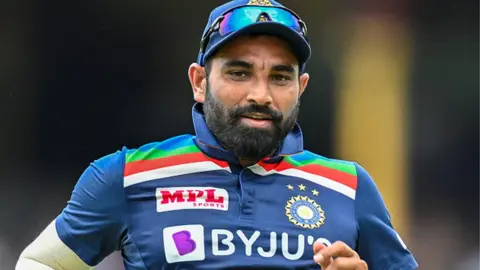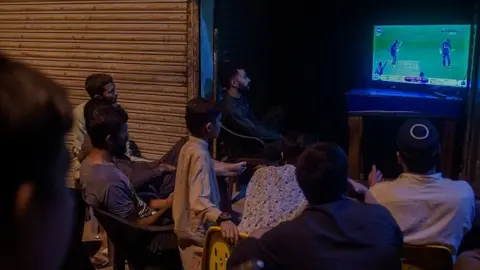T20 World Cup: The toxic trolling of India's cricket stars
 Getty Images
Getty ImagesWhen India's cricket team lost last Sunday's key match to Pakistan in the T20 World Cup in Dubai, Indian fans took to social media to passionately vent their anger.
Much of it was directed at fast bowler Mohammad Shami - the only Muslim player in India's 15-member World Cup squad - who was subjected to vicious trolling and online abuse.
Social media users accused him of deliberately leaking runs to Pakistan and called him "a traitor and an anti-national".
As the attack grew, many people, including veteran cricketers Sachin Tendulkar and Virender Sehwag, spoke in support of Shami. And the Indian Cricket Board tweeted a picture of Shami along with team captain Virat Kohli, who has refrained from commenting on the controversy so far.
Even Kohli's wife and Bollywood actress Anushka Sharma was trolled heavily - as she has been in the past - as irate fans blamed her for the Indian side's loss.
Allow Twitter content?
Last week's match was extraordinary: Pakistan did not just beat India at a World Cup game after 29 years, they thrashed their arch rivals by 10 wickets in a clinical and emphatic manner.
When captain Kohli congratulated his Pakistani counterparts after the match, photographers fervently captured the bittersweet moment and many social media users proudly gushed over it. Some described it as an expression of rare sportsmanship - one that remains unspoilt by the political fault lines that underpin ties between the two nuclear-armed neighbours.
But soon, online abuse took over and disparaging messages to and about Shami started to do the rounds.
While this was happening, news broke that several Kashmiri students were allegedly attacked in the northern state of Punjab for celebrating Pakistan's win. Since then, several other people - all Muslims - have been arrested, with some facing charges under a draconian anti-terror law for speaking, writing or sharing messages in support of Pakistan.
In the past, passionate and combustible cricket fans have smashed TV sets, pelted stones at the players' houses, and burnt their effigies when their team has lost. But as online abuse becomes the dominant form of venting, many worry about the toxicity cricketers face on social media.
 Getty Images
Getty ImagesSports writer Sharda Ugra said that much of the effigy-burning kind of physical response was generated by political parties looking for traction, which was later amplified by the growth of TV news media.
But social media has changed the concept of booing, throwing things on the field and effigy burning "into something much more vicious".
Cricket writer Ayaz Memon says trolls on social media find strength in being anonymous.
"With the internet, there is no geographical limitation - an angry fan may throw stones at my house but it's localised," he said. "But if you attack me online you can attack me from wherever you may be."
A cricket match between India and Pakistan continues to be one of sport's biggest draws and bitterest rivalries.
The arch-rivals rarely play outside of major tournaments due to political tensions. Patriotic loyalties are at their peak as people on both sides of the border throng in front of flickering TV screens to watch what is, perhaps, the most politically charged derby.
But it's not just about Pakistan. In 2009, angry Indian fans burnt effigies of former captain Mahendra Singh Dhoni after the team failed to defend the title in the T20 World Cup in England. And when India lost the T20 final in 2014 against Sri Lanka, disappointed fans pelted stones at all-rounder Yuvraj Singh's house.
Experts say a lot of this fanaticism has abated with time. Mr Memon says this could be because the Indian team has done exceptionally well in the past 10 years.
India has dominated world cricket during this period and entered the tournament as clear favourites to lift the trophy. Even their record against Pakistan in ICC World Cup events has been phenomenal: until last Sunday, India had won all 11 World Cup matches against its neighbour.
 Getty Images
Getty ImagesMs Ugra says India's performance has been particularly good overseas, which may have led to a decline in the extreme behaviour. But at the same time, there has been a rise in online abuse "directed in any form and at anybody".
Cricket players have been able to use social media for commercial reasons - they earn followers and become influencers, she says.
"But the flipside is this kind of trolling and abuse, which is almost like a hobby for some. It has almost become this ghastly demon where the Indian fan has changed - because this whole 'we give it back' kind of macho mentality has come in."
Mr Memon says this shift also has something to do with the culture of outrage.
"People are more on edge, more touchy and less patient and more demanding," he explains. "You lose one match and it's the end of the world."
Hyper nationalism and jingoism during a cricket match in India are not uncommon. But as the anger moves online, experts say it is becoming "more aggressive and entrenched".
"Cricket has always been used as a political currency on both sides of the border," said Ms Ugra.
"Even television was pointlessly aggressive when it came to the Indian team losing. But that mindset has now translated into scapegoating culture on social media."
India all-rounder Irfan Pathan also recently spoke out against it. "Even I was part of #IndvsPak battles on the field where we have lost but never been told to go to Pakistan! I'm talking about India of few years back," he tweeted.
Allow Twitter content?
According to Mr Memon, the changes are "a reflection of the times we live in".
"Whatever we saw happen to Shami isn't linked to cricket," he said. "Anyone with even an iota of cricketing intelligence knows that one bad performance does not mean anything - that guy has got a fantastic record."
The situation, he says, isn't "black-or-white" where all the people, disappointed by India's loss, will be hurling abuse and invective at Shami or even the team.
"He's being targeted by a certain profile of people for a different agenda."
Ms Ugra adds that this kind of trolling is a result of the "normalisation of minority abuse by the ruling establishment".
"The tragedy of it is that the team is now fearful of even saying the right thing to defend a teammate. I don't for a moment doubt that as active sportspeople, they are all very fair-minded and they back each other up. But they lack the confidence to do the right thing in public," she says.
